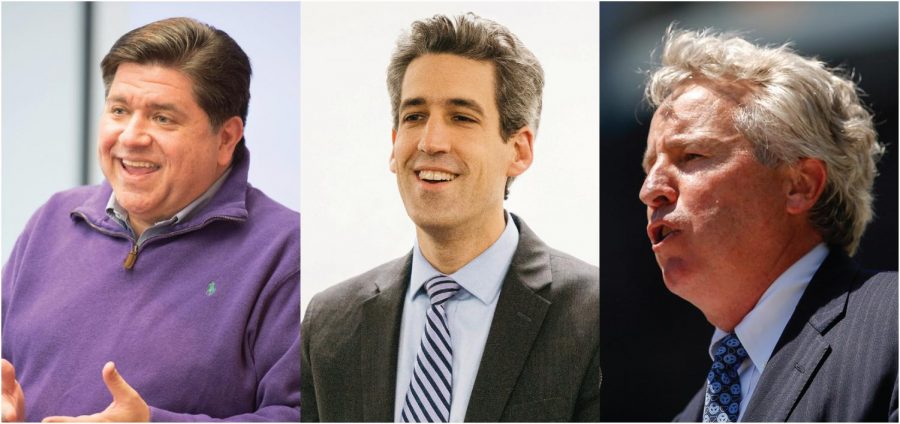Three major democratic gubernatorial contenders to square off in March 20 primary
Billionaire J.B. Pritzker. State Sen. Daniel Biss (D-Evanston). Businessman Chris Kennedy.
March 9, 2018
Four years ago, Bruce Rauner became the first Republican to net the governor’s seat in Illinois in over a decade. Now, after over three years of Rauner’s unpopular tenure, which saw Illinois without a budget from 2015 into 2017 and featured a tense rivalry with House Speaker Mike Madigan (D-Chicago), Democratic Party hopefuls are aiming to take the seat back.
Three major contenders have pulled away from the rest of the pack: J.B. Pritzker, a billionaire businessman who is the heir to the Hyatt Hotel fortune, State Sen. Daniel Biss (D-Evanston), a local legislator pushing progressive policy, and Chris Kennedy, an anti-establishment businessman who is the son of former U.S. Senator Robert Kennedy.
Each of the three has struggled to take a firm hold on the race, but feverish campaigning will reach its conclusion for all but one candidate on March 20, when the winner of the Democratic primary will be determined and advance to the general election in November.
The Billionaire
Pritzker is a Chicago native and a graduate of Northwestern’s Pritzker School of Law. He is by far the wealthiest of the candidates, with an estimated net worth of $3.5 billion, according to Forbes.
Pritzker has centered his campaign on restoring a balanced budget to the state to address its poor fiscal condition, and has said he will prioritize increased investment in education spending across the state. Pritzker also has said he wants to focus on “restoring and rebuilding” Illinois’ social services.
The billionaire has received endorsements from both of the state’s U.S. senators and many state lawmakers, as well as the Cook County Democratic Party and a few major labor unions.
However, Pritzker has faced criticism after a leaked wiretap conversation between him and former Gov. Rod Blagojevich discussing filling Barack Obama’s vacant senate seat. In the conversations, Pritzker said appointing Jesse White would “cover you on the African-American thing” and that White was the “least offensive” of the candidates for the job.
A Feb. 18 poll of Democratic voters from Cook County found that Pritzker held a slim 3 percentage point lead over Kennedy. However, a more recent poll from the Paul Simon Public Policy Institute at Southern Illinois University at Carbondale — which sampled 472 Democratic voters from across the state — showed Pritzker with 31 percent of the vote, 10 percentage points ahead of the next closest challenger, Biss, with Kennedy in a distant third.
The State Senator
Biss, who lives in Evanston, has positioned himself as the “middle class candidate” who is trying to take the money out of politics. Biss has repeatedly claimed that he is the most progressive of the candidates vying for office.
Biss said in an interview with the State Journal-Register that his top priority if elected would be to modify the flat tax system in Illinois to a progressive one, meaning wealthier taxpayers would pay taxes at a higher rate than those with lower incomes.
Political reform is another key component of Biss’ platform, as he said he will use the position to put in place new processes for election protocol. According to the state senator’s website, Biss’ plan includes term limits on leadership in the state Senate and House of Representatives, publicly financed small donor matching for campaign contributions and expanded access to ballots.
The biggest issues for Biss have come from his backing of a 2013 pension reform plan that was later ruled unconstitutional. The plan reduced benefits, but did not take away pensions from anyone, according to the State Journal-Register.
The Businessman
Kennedy has political blood in his veins, as his father Robert Kennedy was a former U.S. senator and Attorney General and his uncle, John F. Kennedy, was a former U.S. president.
The businessman, who has pushed hard for property tax reform, is centering his campaign on expanding the economy and creating more jobs in Illinois, as well as promoting expanded health care access while reducing costs for state residents.
Kennedy and his running mate, Ra Joy, are also running on a platform that focuses on taking steps to reduce gun violence, as both men have had uniquely personal experience with the topic. Kennedy’s father was killed when he was shot on the presidential campaign trail in 1968, and Joy’s son was shot and killed last summer after he was robbed of his cellphone.
The former president of Merchandise Mart Properties made missteps on the campaign trail after he said Chicago Mayor Rahm Emanuel was at the top of a “strategic gentrification plan” designed to force African-Americans out of the city. Kennedy also praised Rauner in January for “trying to do what he thinks is best for the state,” a statement other candidates have jumped on when attacking Kennedy. Kennedy later back tracked on his praise for Rauner, saying he was one of the worst governors in Illinois history, “including those who went to jail.”
The three will face longshot candidates Bob Daiber, Tio Hardiman and Robert Marshall on March 20 in the Democratic Primary.
Email: [email protected]
Twitter: @ryanwangman


